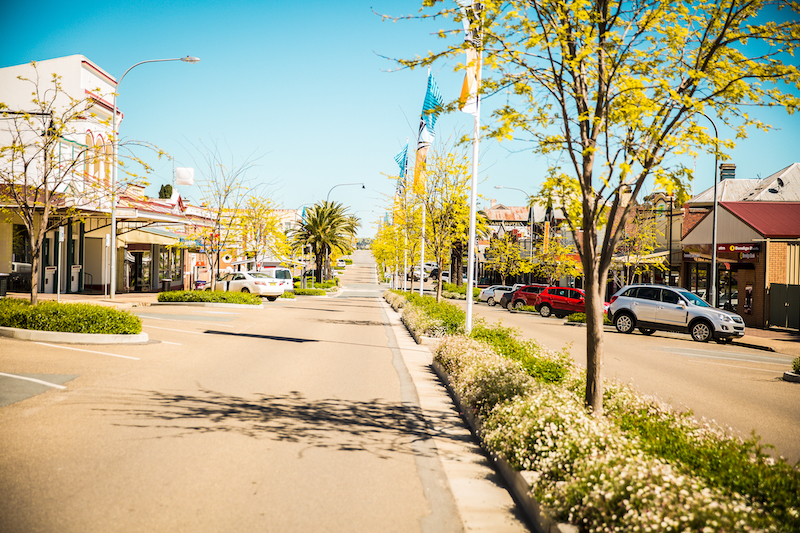
Much effort has been made to make Harden a more attractive town but businesses are struggling to find full-time skilled staff. Photo: Hilltops Council.
A skills shortage in Harden Murrumburrah and district shows no sign of easing despite offers of higher wages and housing.
North-west of Canberra in Murrumburrah, businesswoman Karen Kemp runs the Lighthorse Hotel and would open seven days a week and take on more casual staff if she could find a chef.
One chef already works at the popular hotel and Ms Kemp is offering a house as part of a remuneration package to attract a suitably qualified chef. She would also be prepared to sponsor someone from overseas, but this has not lead to a solution.
“Not everyone wants to come on a visa to a conservative country town. It is not easy for them being on their own,” she said. Yet that is what the Australian Government hopes will happen across rural towns and villages.
The government is setting aside 25,000 visas for migrants prepared to work in rural areas in 2019-20, an increase of about 15,000 new visas on 2018-19 to help ease population pressure on capital cities. In rural places like the twin towns of Harden Murrumburrah and nearby Boorowa, help from outside to address a skills shortage cannot come soon enough.
Maddens Refrigerated Transport in Harden runs a fleet of 25 trucks on the Sydney to Melbourne route, and would grow exponentially if it could employ more drivers.
“We could do with six more drivers; we are approaching the busy season,” Maddens operations manager Steve Gauci said. “It is a constant search. We have increased our numbers, but we have lost others through retirement.”
Mr Gauci said the rural location was only a part of the challenge. The hours of work were also daunting for some people. Other transport companies were similarly short-staffed, and finding the right people with good prospects of them being long-term was difficult because of the after-hours work involved.
In Boorowa, Corkhills Engineering principal Matthew Corkhill has spent thousands of dollars advertising since December for a boiler-maker. He could also do with a machinist and is always on the look-out for people with workshop skills. He pays his tradesmen more than what they would earn in a Sydney workshop and their living expenses in Boorowa are one-third of what they would be in the city. Nevertheless, the lack of applications remains intractable.
“The knock-on effect is if I cannot find tradesmen, I cannot train apprentices,” he said. He would happily take on people from overseas.

Harden Region Development Corporation Chief Operating Officer Chris Ireland. Photo: Supplied.
Fortunately, Harden Murrumburrah has filled a key senior position requiring specialist skills. Queenslander Chris Ireland has replaced Harden Regional Development Corporation’s former chief operating officer Tony Holland, who left earlier this year for Melbourne. Mr Ireland comes from the Gold Coast where he completed two-and-a-half years at Rockhampton Regional Council as manager of regional development.
He has always been in local government, and the role in Harden Murrumburrah attracted him interstate.
“It doesn’t matter where I work, so long as I am having a strong impact on the community, where I can see the impact I am having from my workdays,” he said. “That appealed to me more than a location. The fact this was a beautiful location, great weather, country lifestyle and salt-of-the-earth country people were the added cherry on top,” he said.
While some professional people commute from Canberra or other towns to work at Harden Murrumburrah, Mr Ireland has chosen to live in the town. He arrived four weeks ago.
Mr Ireland said skills shortages were always topical in regional areas, and would need to be addressed if the ambitious goals of the strategic plan and economic potential of the region were to be realised.
The Strategic Plan was released in 2018 and runs for three years, focussing on five outcomes: creating opportunities for economic growth; increasing innovation by implementing technology; increasing access to residential and industrial land; consolidating a caring and inclusive community; and building collaboration, partnerships and brand awareness.
Attracting, retaining and building skills in the region are crucial to these outcomes.
“I am leading the bandwagon to prioritise different projects and events we are going to be doing across this region to build the economy and carry out our strategic plan,” Mr Ireland said. “It is something I do want to look at tackling into the future.”












